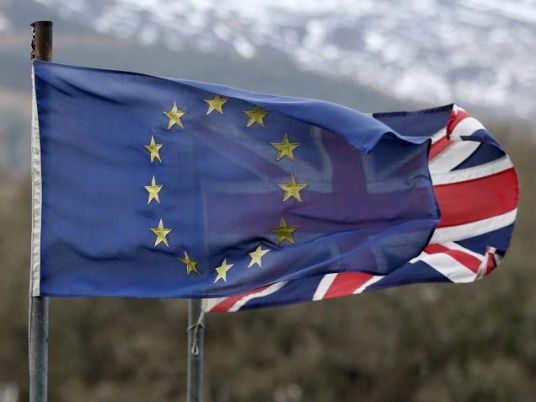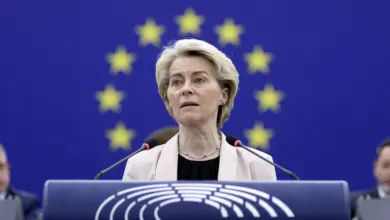
Deborah Hastings will only decide whether Britain should ditch its European Union membership on the eve of a referendum likely in late June. She has one key question for those courting her vote: Will leaving make me and the country richer or poorer?
As opinion polls show Britain is divided on the EU, Hastings and up to 10 million other voters, many of them women, have yet to make a decision. How they cast their vote will shape the future of the world's fifth largest economy and the EU itself.
Hastings, a 57-year-old resident of rural Devon in southwest England, votes for Prime Minister David Cameron's Conservatives. She says Britain has long received a "poor man's offering" from what she views as a German and French-dominated bloc. She even blames the EU's emissions rules for forcing the beloved Land Rover Defender 4×4 she drives out of production.
Hastings said Cameron's plans to cut the benefits paid to EU migrants have started winning her over in recent days. But weighing against an 'out' vote, she would be concerned about what would happen to the coach loads of German tourists who support the local economy.
Open to persuasion, she has a message to those who want her vote. Talk less about immigration and give more detail on whether Britain would be better or worse off outside the EU.
"If we left, would we really fall off a cliff?" Hastings asked in Eggesford, a rural parish some 170 miles (270 km) west of London. Voters in southern England are among the most undecided according to a recent YouGov poll.
"Will we get new markets? Which markets will we lose? What will be the import-export controls on both sides?" says Hastings, whose husband and son both intend to back leaving the EU, seeking answers from those wanting a British exit.
Around one in five British voters tell pollsters they have yet to make up their minds. Many are middle-aged women who support Cameron's Conservatives and live outside London and Scotland, two of Britain's most pro-European areas.
If Cameron is to keep Britain in the bloc it joined in 1973, he will need to secure the vote of millions like Hastings.
The rest of Europe is watching warily – Britain is the EU's second largest economy and one of its top two military powers.
Pro-Europeans warn an exit from the EU would hurt Britain's economy and could trigger the break-up of the United Kingdom by prompting another Scottish independence vote. Opponents of EU membership say Britain would prosper outside.
"The economy, stupid"
Whilst surveys suggest immigration – which has dominated headlines in the right-wing British press – is voters' top concern, long-term polling and previous votes show concerns over economic security can ultimately turn the undecideds.
"Even though they may be as likely to mention immigration as a big concern or access to benefits, ultimately the economy will swamp them," Ben Page, chief executive of polling firm Ipsos MORI, told Reuters.
"People talk about all these things, but ultimately: it's, am I going to keep my job?"
Britain, whose economy had fallen far behind both Germany and France in 1975 when it last voted on membership, has been one of the fastest growing major economies over recent years, overtaking France as the EU's second largest economy in 2014.
Opponents of membership say the strength of Britain's $2.9 trillion economy shows it could prosper if London cut loose from what they say is a doomed experiment in German-dominated unity and excessive debt-funded welfare spending.
Supporters of membership, including Goldman Sachs and Morgan Stanley, have warned a divorce from the world's biggest economic bloc could hammer sterling and jeopardize London's position as the only financial center to rival New York.
Undecided voters concerned about the economy helped swing the 2014 Scottish independence referendum, when Scots voted 55-45 for a continued union with England, and the 2015 election, when voters gave Cameron an unexpected majority, Page said.
Over half of Britons expect Cameron to get a bad deal on reforming Britain's EU membership at a summit starting Thursday, according to a ComRes poll. But more voters than not believe that personally, and as a country, they are better off in the EU.
For Gerry Gunster, an American whose advocacy firm is working for the Leave.EU group, a key part of convincing floating voters is tying their vote to personal circumstances.
"One of the things you are going to ask yourself is: is this good for me, is this good for my family, is this good for my community, is this good for myself, my pocket book, these are really important factors," he said.
"The devil you know"
Lydia McGrath, a young mother and business owner in the northern English county of Yorkshire, is also leaving her decision until the last minute.
McGrath, a Conservative voter, is worried about immigration putting pressure on local services.
"I think a big part of me thinks it would be nice for us to stand on our own two feet and be quite strong," said the 35-year old who runs a firm selling services such as high pressure jetting and drain repairs.
But then she has her doubts.
"How successful would we be without the EU? I'm not too sure. It's big and strong and… to stand on our own might be a bit of gamble, a bit of a risk. Better the devil you know, than the devil you don't," she said.




